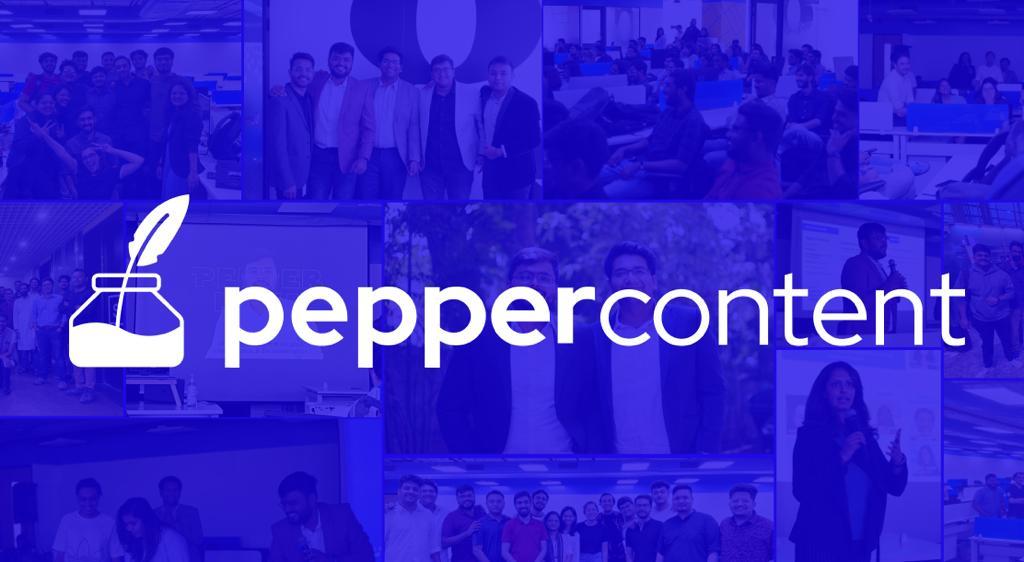
As a company becomes bigger in size and aspirations, it becomes almost impossible for the founders to be the sole flag bearers of what the company culture comes to be. Culture, in its most rudimentary form, is the sum of parts of all the individuals that make up an organization. Initially, it is more of what the founders are until it transforms into something that faintly resembles what it was and more of what it can be—which happens to be this very moment at Pepper. And this is when it needs to have a set of principles, a pathway of sorts, for it to be the best version it can be.
As a company blitzscales, culture happens to reverse the hierarchy and assumes control over the very people that created it in the first place. And in no time, people are the result of the culture that breathes within the fabric of your organization. As the famous Hubspot Culture Code says, “Culture is to recruiting as product is to marketing.”
As a 23-year-old building his first company, while focusing on disrupting the content space, one question keeps coming back to me: how can we build something that outlasts us? I have asked myself this as Co-founder of Pepper when it had five, ten, 50 employees. And now, as we touch the 150 employee mark, the question remains more pertinent than ever.
How can we make Pepper a company that outlasts its creators?
When Anirudh and I co-founded Pepper in 2017 in a dorm room at BITS Pilani, we clearly understood that we were solving a real problem. People needed content, and we could help make that happen (with our own set of doubts, obviously). As businesses adapted to the COVID-19 pandemic, we realized that “every company truly is a content company,” and we stand at an intersection where the creator economy is booming, and businesses can see that content is the need of the hour. We stand at a precipice, and we are ready.
The business’ vision has been clear, and over the years, our mission has only become clearer. But what about Pepper, the company?
Gone are the days when people spending decades at a company was the norm, with the average lifespan of employees trending downwards. As New India builds upon the momentum of the giants of the previous generations, it does so with greater intensity, passion, and vigor. Companies are being built with the kind of speed and ambition that hasn’t been seen before. But with this increasing velocity, the fluidity of people has never been higher. Companies and founders are struggling to attract and moreover, retain quality talent. In fact, according to a report by KPMG, India has a retention rate of 80%-85% and it is dipping at an alarming rate. In an environment where the talent wars are getting uglier, we are striving to build a company that can break away from the fight.
One of the most exciting (and challenging) aspects of running your own business is that you can choose the culture you want to create. Whether we accept it or not, whether we are intentional about it, every decision, every hire, every policy defines your culture and who you are. Over the years, I have drilled down and broken culture into two of the most basic building blocks.
Meet Pepper
Come for the vision, stay for the people
At a micro-level, how can you know a company’s culture? How “any two people interact within the organization” is probably the closest marker of the culture of the company. How two colleagues, irrespective of their position or seniority or any other variable, talk to each other with the utmost sense of respect and kindness forms the core of the overarching theme of culture itself. As young entrepreneurs hiring experienced professionals across all fields, we must retain a learning mindset that fosters growth and goes beyond barriers of traditional “hierarchy.”
While the vision of the company might attract people to Pepper, why they stay is determined by what these interactions look like on a day-to-day basis. Visions are easy to forget, especially when you don’t feel a connection or a sense of belonging at work.
Every idea counts
As a couple of 20-something-year-olds creating a business plan, contemplating what this “business” would look like, nobody understands the value of an idea more than us. Imagine how ridiculous it would be for us to build a company where conversations (sometimes even heated ones) are not encouraged? Perhaps it is the student in us that believes there’s no such thing as a stupid question, and this “college mindset” is a second close indicator of what good culture looks like.
What people feel before they ask a question says a lot about the company’s culture. If they feel, “What if the question is stupid?” or “What if they don’t like my question?” then we’re doing something wrong. If they feel excited at the prospect of what the answer can be, that’s the track we want to be on. How we talk about ideas, debate the big and small decisions, and the energy that we bring to work every day is a small, often-ignored aspect that has a big impact in the long run.
I am aware that not every founder would agree with this, and that’s the best part. I have tried to simplify it for myself, and focused on trying to improve consistently on the two counts mentioned above. As we grow, I am sure there is much more to what we can do here at Pepper. But that is the thing about differing viewpoints. Much like culture, opinions, too, change and adapt and eventually turn into a version of themselves that accommodates all present variables. Continuous development and consistent effort is the only way we can thrive.
They say integrity is when you do the right thing, even when no one is looking. A company’s culture, too, is similar in a way. It’s that sneaky feeling that creeps up on you on a Sunday evening or when you’re about to enter the office on Monday. Shaping our company’s culture is an act of care and service to its people. So if it is work that we’re dedicating a huge part of our lives to, then let us build something for the ages. And that just might be the greatest secret to building a company that we love.
Latest Blogs
Explore how Google’s 2025 AI search updates triggered ranking chaos. Learn actionable strategies to adapt your SEO for AI Overviews, zero-click searches, and SERP volatility. Stay ahead now.
Learn how to rank on AI search engines like ChatGPT, Perplexity, and Gemini by optimizing your content for authority, structure, and relevance. Stay ahead in AI-driven search with this strategic guide.
Explore the best healthcare SEO services for your medical practice. Improve online visibility and effectively reach more patients in need of your services.
Get your hands on the latest news!
Similar Posts

B2C Marketing
5 mins read
Top Choices for Best Content Marketing Services in B2B Industries

Artificial Intelligence
5 mins read
How Free AI Tools for Content Creation Can Boost Your Content Strategy

Artificial Intelligence
6 mins read